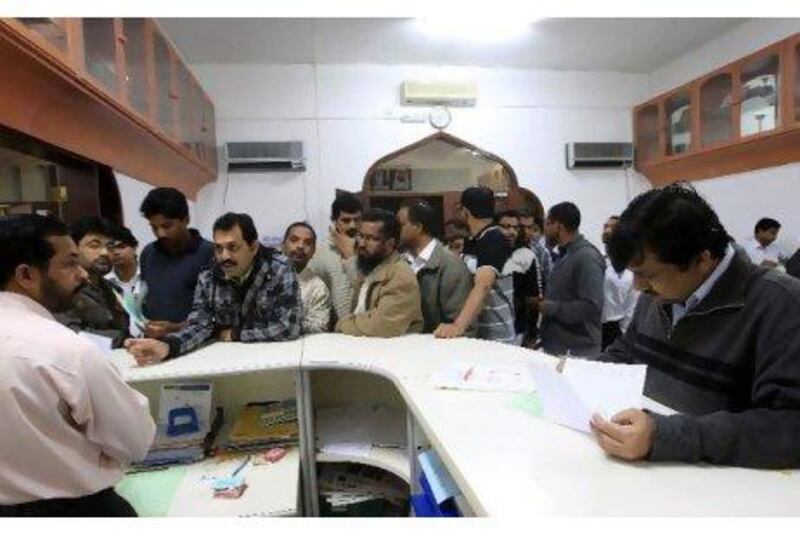Abu Dhabi // An extra 16,700 places will be made available at Indian schools in the capital within the next four years, according the Abu Dhabi Education Council.
Members of the Indian expatriate community have said there is a dire shortage of spaces in schools catering to their children.
"We are aware there is an increase in demand for Indian schools and we are doing our best," said Yousif al Sheryani, Executive Director for Private Schools & Quality Assurance Division at Adec.
More than 1,300 new spaces were added for the 2011 academic year, in part due to capacity created by the opening of The Private International Indian School in September. Spaces were also freed up when Adec allowed two schools to increase their intake.
The projected increase of 16,700 over four years will be achieved in much the same way: certain schools will be allowed to increase their intake, and at least three new schools will open within two years, Adec officials said yesterday.
Adec will decline requests to increase class sizes if schools are not meeting safety standards. "Schools can apply to increase capacity but if they are not meeting the safety standards, they will not be allowed to," said Mr al Sheryani. "We will not put in place any quick-fix for the problem at the cost of the students."
Adec has already given land to three investors who will build Indian schools, and is still inviting investors to apply for land. Vacant government schools were also offered last year in support of villa schools; this may be considered again this year, officials said.
The call to investors was first made a year ago; the council hoped it would encourage construction of more Indian schools.
However, of the 29 school licences issued by Adec last year, only four were for Indian-curriculum institutions.
"Providers need to apply, and have to fulfill certain criteria before they are licensed," said Mr al Sheryani. "The health and safety of the students is one of the main factors that must be taken into consideration to attain a licence."
"We also need to make sure the investor will be able to provide quality education and has the capability to manage a school."
The capital currently has only five Indian schools in purpose-built facilities. Around 12 Indian schools are run out of villas, all of them operating at maximum capacity.
Government plans to shut down all villa schools by 2014 have added pressure on the already-strained system, some principals say.
The Upper Wisdom Private School is a villa school with 600 students. Despite a long waiting list, the school cannot admit more students. "This is our total capacity and the admissions are on first-come, first -served basis," said Saji Oomen, the principal.
Last March the Gems-owned Our Own English High School in Abu Dhabi reported a waiting list of 3,500 students.
But, while some schools say their waiting lists are similarly full, Adec officials said the overall number was probably inflated because many parents may have applied to multiple schools. Adec is in the process of training school management to monitor enrolments, in order to collect reliable figures on the extent of the shortage of places.
Mr Oomen said his school had applied to Adec for land, and was in the final stages of approval. "We hope to start our new school by 2012 or at the latest 2013 with capacity for 2,000 students," he said.
He said most Indian schools cater to a certain section of society which seeks affordability without compromise on quality, which makes the sector difficult for investors. "When you provide better facilities the cost of education goes up, and many parents cannot afford it."
Mr Oomen said he will be hiking his school's fees when they moved to their new building.
A Gems official said yesterday they were also in talks with Adec and "hope to open a purpose-built Indian school in Abu Dhabi next April."
Delhi Private School, which has branches in Dubai and Sharjah, will open in the capital next year, the chairman of the school’s owners said yesterday.
At full capacity, the school will be able to enrol more than 3,000 students. Ashok Chandra, chairman of The Delhi Public School Society, which owns the schools, said enrollments will begin in 2012.
“We assessed the need for good schools and found a possibility of setting one up in Abu Dhabi,” he said, adding that the project has been allotted land by the government and construction was underway.
The first Delhi Private School (DPS) opened in Sharjah 10 years ago, followed by a Dubai branch.
Mr Chandra said the management saw the urgent requirement for Indian schools in the capital and jumped at the opportunity.
“Our schools in Dubai and Sharjah are saturated now and I know the school in Abu Dhabi will be as popular because of the large Indian expatriate population here.”
The new branch will offer respite to a number of students who commute daily to DPS in Dubai, said Rashmi Nandkeolyar, principal of the Dubai branch, which is located in The Gardens community.
“Some parents said they have had to shift to Dubai so that they could attend the school and we also have a few children who also travel from Abu Dhabi everyday so the new DPS will be an option for them,” she said.






